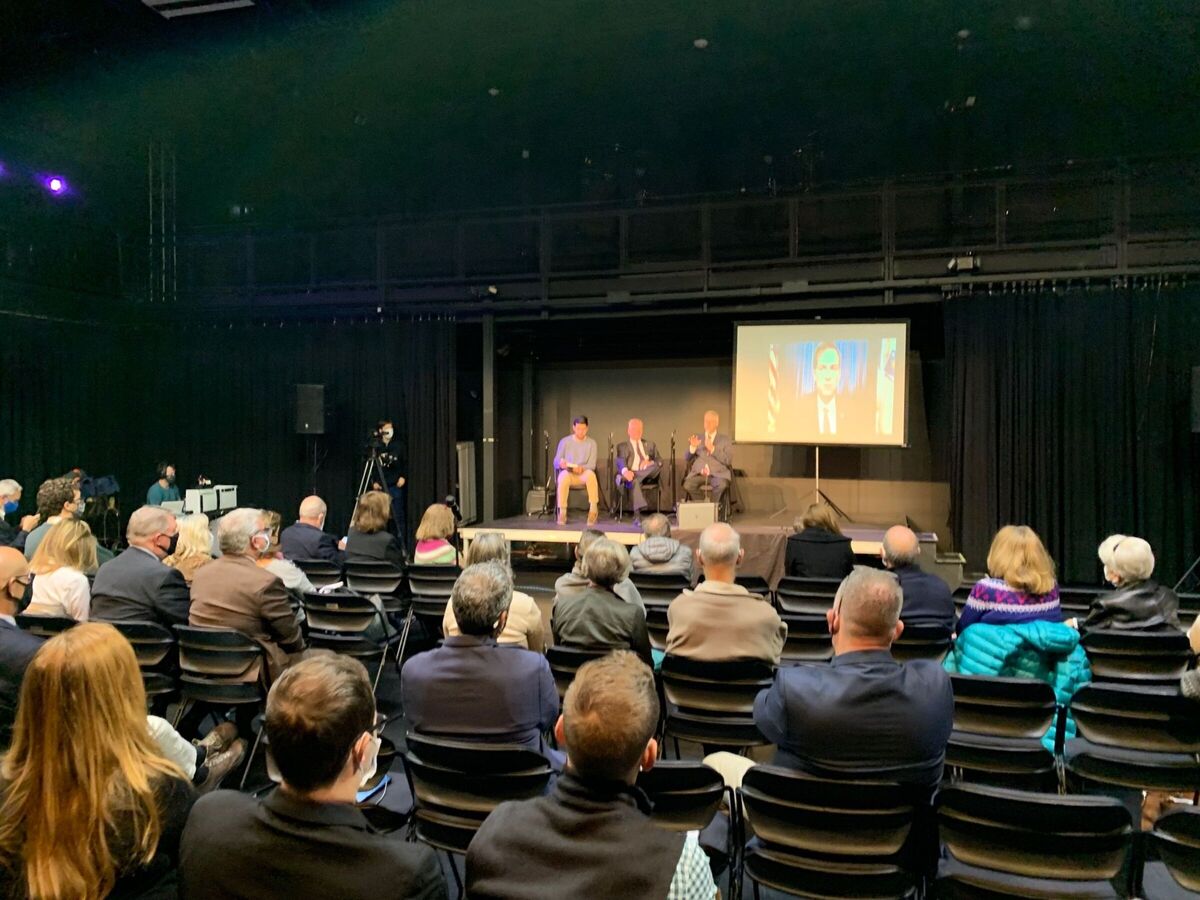Image

Monday morning at the Black Box Theater, a “Town Hall” was convened under the auspices of Congressman Jake Auchincloss. featuring as guest speaker, author Charles Marohn, founder of Strong Towns, an organization that advocates for denser towns and cities that can be more financially sustainable.
Although forced to attend via a video link due to Congressional duties, Auchincloss was joined by co-organizers, State Representative Jeff Roy, and Franklin Town Councilor Cobi Frongillo, who originally suggested the idea.
Citizens and town leaders from Franklin and several other municipalities as well as members of the Massachusetts legislature were also in attendance.
Frongillo provided introductory remarks in which he noted the tendency of Franklin to spread out during the post-World War II period. “It's hard to financially sustain a model and development pattern that we've had over the past few decades,” Frongillo noted. What’s more, the “downtown” which was once vibrant has continued to slip behind.
However, he noted, recent state and local grants, totaling some $200,000 will be spent on a “full downtown zoning diagnostics” and on getting input from the community.
He praised Roy and Auchincloss for the help they are bringing to the town.
Roy then spoke, acknowledging help from the Black Box and the presence of his fellow legislators. He noted that he had served as chair of the Master Plan committee during his time on Town Council. Roy noted that a goal of the Master Plan had been more transit-oriented housing, which he said has since led to the creation of some 185 units within walking distance of Dean Station – and other units near Forge Park.
Roy introduced Auchincloss and acknowledged the Congressman’s military service in Afghanistan. He also alluded to his work on the Newton City Council.
Auchincloss mentioned that both he and Frongillo had become disciples of the Strong Town movement.
Marohn, for his part, said he wanted to invest in the relationships between Jake and this community and between Kobe and Jake and “the changing relationship of what it means to be a public official.”
Marohn said the housing policies that came out at the end of World War II were in part an effort to prevent a return to the Depression. The “answer” was to build the interstate highways, and make unprecedented investments in sewer and water infrastructure. “We took all of this capital...and we pumped it into building a new version of America,” Marohn said.
However, he said a fundamental mistake of the era was to simply “add another mile of pipe” to allow more development without recognizing the future maintenance liabilities those policies would create.
Thus, Marohn advocates for a reversal of the policy, encouraging, for example, denser development around infrastructure so that, in the example of the mile of pipe, there would be more rate-payer per mile, making it financially sustainable.
Marohn’s vision, as heh explained it, also includes lots of bike lanes (“the best return on investment you can make”) and an end to, in effect, subsidized parking. Instead, he explained, more and more development needs to occur around public transit.
And, single-family zoning also needs to be reconsidered as a way to create more housing and more affordable housing as well as helping to address the hidden costs of infrastructure sprawl.
It is a process he calls “thickening up” a community.
In a question and answer session he heard from many municipal officials, and a hard-fought effort in Newton to reduce the use of single-family zoning was highlighted as a success story.
“
This is a great moment,” said Marohn, “because it's a moment where we can actually take the macro action, the federal action, and connected it in kind of a service way, in a leadership way to the local conversation.”
Below, Rep. Jeff Roy, Author Chuck Marohn, Town Councilor Cobi Frongillo, with Cong. Auchinloss on screen in the background.